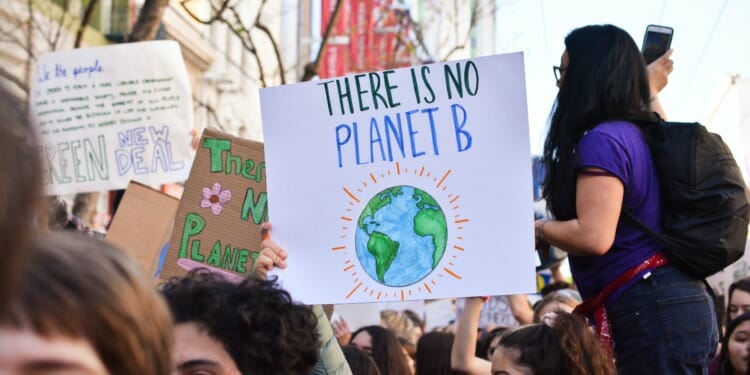The 2021 United Nations Climate Change Conference in Glasgow, also known as COP26, will see 197 world leaders come together to discuss the future of the planet. The UN has called the Climate Crisis a ‘Code Red for humanity’ and we certainly need governments and big businesses to act and drive significant change. However, ambitious pledges by leaders and institutions won’t be enough; resolving climate change demands significant action from us all.
Expert bodies, including the UN, the IPCC and the Committee on Climate Change (CCC) agree that net zero can only be achieved if we as individuals shift our behaviours, especially those of us living in the Global North. When you consider that, in the UK, households are the largest emitter of greenhouse gases, it’s clear to see why we have such a big part to play.
Starting in our own homes, here are four key areas where we can take simple, immediate and impactful action to mitigate climate change: food, transport, energy and consumption habits.
Food: the where, the what and the waste
Roughly 25% of our personal carbon footprint comes from food. To reduce it we need to think about where our food comes from and what we eat.
We’ve become used to all food being available all of the time, but food grown in artificial conditions or transported on air freights comes at a heavy price to the planet. Instead, look to swap to locally produced food in season.
More challenging perhaps is the what, specifically the call to reduce our meat and dairy consumption. Research by Oxford University concluded that if every family in the UK swapped red meat for a plant based meal just once a week the reduction in CO2 emissions would be the equivalent to taking 44% of the UK cars off the road, the equivalent of 16 million cars.
Food waste is another big contributor to greenhouse gas emissions. If the food industry were a country, it would be the world’s third largest emitter of CO2 and the majority of food waste comes from homes. Shopping to a list, planning meals and understanding Use By and Best Before dates can help.
Transport: Ditch the car
In the UK, around 60% of all journeys under 2 miles are made by car. Making time to walk or cycle shorter journeys which are often the most polluting can have an impact. Switching to public transport where possible or car sharing benefits everyone. Careful planning of our journeys to incorporate different stop offs can help reduce the amount of journeys we make as well as saving us time and money. Switching our engine off when we are waiting reduces pollution levels. An idling engine can produce up to twice as many exhaust emissions as an engine in motion. Idling for more than 10 seconds uses more fuel and produces more emissions than stopping and restarting your engine does.
Energy: Keep the heat in, turn the heat down.
When it comes to heating our homes, the simplest thing we can do is keep the heat in; ensuring our homes are properly insulated. Turning the thermostat down by just 1 degree could save 3.5 million tonnes of CO2 across the UK. Even seemingly trivial everyday actions like taking shorter showers, turning lights off and not leaving appliances on standby are all easy wins that lower energy consumption and save money too. We can also choose a renewable energy supplier. Buying renewable energy funds investment and encourages divestment from fossil fuels.

Consumption: Think before you buy
Every time we buy a new product, energy and resources have had to be used to produce that item. Recent decades have seen us enter the age of mass consumption. Whether it’s through fast fashion, ‘must-have’ devices or use and throw away consumables, it’s easy to get caught up in the buy now culture. Reducing our overall consumption of ‘stuff’ whilst buying second hand, repairing, sharing or borrowing can drastically reduce our consumer impact.
What about the Government?
As well as the practical steps, we can lobby governments and corporations to take action against climate change. Lobbying lets our politicians know what we think. Similarly, as consumers when we purchase or use something, we cast a vote for that product.
In his green-lifestyle guide, How Bad are Bananas, Mike Berners-Lee writes, “By making our own changes we demonstrate that we care. It is our way of proving to the politicians and businesses that we are serious.”
The Bottom Line
Whether out of necessity or moral obligation, how we behave as individuals matters. Not only because personal carbon footprints make up such a large part of a nation’s CO2 emissions, but because ultimately, our views force governments and corporations to act.
Climate change and its ensuing crisis can be overwhelming and it’s tempting to abdicate responsibility to governments and those meeting at COP26. For sure, these leaders wield great influence and power, but we shouldn’t underestimate our role and the great impact we as individuals have.
In the words of the anthropologist Margaret Mead, “Never doubt that a small group of thoughtful, committed citizens can change the world: indeed, it’s the only thing that ever has.”
Editor’s Note: The opinions expressed here by Impakter.com contributors are their own, not those of Impakter.com. — In the Featured Photo: Person holding There is no planet B poster at a climate change rally. Featured Photo Credit: Li-Ann Lim










